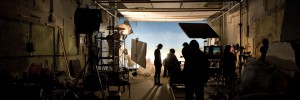University degrees: Postgraduate
Course length: 2 years
This course provides a unique environment in which directors can find their individual style and their own distinctive voice.
This course provides a unique environment in which directors can find their individual style and their own distinctive voice.
“The NFTS is right at the heart of training for the industry.” Graduate David Yates, director of the Harry Potter series and Fantastic Beasts and Where to Find Them.
The course is highly practical, giving students the opportunity to make high quality films in our in-house studios or on location. They will also have the chance to learn from top industry professionals.
Students will collaborate with those in other specialisms to make several films and practical projects, putting into practice the skills they learn along throughout the course – with all production costs met by the School. The NFTS has purpose-built film and television studios and professional standard post-production facilities.
All NFTS students can attend the School’s masterclasses programme, with recent guests including Martin McDonagh (In Bruges, Three Billboards Outside Ebbing, Missouri), Phoebe Waller-Bridge (Fleabag, Killing Eve), Asif Kapadia (Amy, Senna, Diego Maradona), Lynne Ramsay (You Were Never Really Here, We Need to Talk About Kevin), Louis Theroux, and M Night Shyamalan (The Sixth Sense, Glass).
This course is industry recognised by ScreenSkills, the industry-led skills body for the UK’s screen-based industries, and carries the ScreenSkills Select quality-mark which indicates courses best suited to prepare students for a career in the screen industries.
This course provides two years in which directing students will be adding depth and understanding to their abilities whilst regularly producing work. This is an environment where they will be both challenged and supported by staff and fellow students.
The essence of the course is the practical experience of film-making, combined with a wide-ranging series of work-shops emphasising performance, mise-en-scène and an examination of how narrative works in cinema and in television. The tutor to student ratio is high, thus allowing the teaching to be specific to the needs of the individual director.
The course includes weekly sessions on film and television culture, both contemporary and historical, and opportunities to learn from the work of more established directors through masterclasses and set visits. It also involves interaction with other disciplines, ranging from visual art, literature and architecture to installation and performance art.
